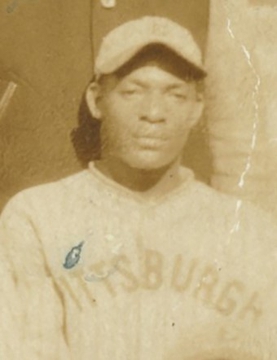Bill Perkins (baseball) facts for kids
Quick facts for kids Bill Perkins |
|||
|---|---|---|---|
 |
|||
| Catcher | |||
| Born: June 26, 1906 Dawson, Georgia |
|||
| Died: January 24, 1958 (aged 51) Birmingham, Alabama |
|||
|
|||
| debut | |||
| 1928, for the Birmingham Black Barons | |||
| Last appearance | |||
| 1948, for the Baltimore Elite Giants | |||
| Teams | |||
|
|||
William Gamiel Perkins (June 26, 1906 – January 24, 1958) was an American baseball catcher. He played in the Negro Leagues from 1928 to 1948. Perkins was known for his great skills behind the plate. He played for many different teams during his career.
Contents
The Catching Career of Bill Perkins
Bill Perkins was born in Albany, Georgia. He became famous for being the personal catcher for the legendary pitcher Satchel Paige. This meant that Paige often chose Perkins to catch his pitches. Perkins even had a special chest protector that said, "Thou shalt not steal!" This was a fun way to warn runners not to try to steal bases when he was catching.
Playing with Baseball Legends
Perkins played for the Pittsburgh Crawfords team. While there, he was the backup catcher for another baseball superstar, Josh Gibson. Even as a backup, Satchel Paige preferred Perkins to catch his super-fast pitches. This shows how much Paige trusted Perkins's catching abilities.
All-Star Games and International Play
Bill Perkins was recognized as one of the best catchers in the Negro Leagues. He was chosen to play in two East-West All-Star Games. These games featured the best players from the eastern and western teams of the Negro Leagues. He played in these special games in 1934 and 1940.
Perkins was also one of the players who went to play baseball in other countries. These players were sometimes called "jumpers." He played in Santo Domingo, a country in the Caribbean. This happened when tropical countries started their own summer baseball seasons.
Serving His Country
During his career, Bill Perkins also served in the United States Army during World War II. After his military service, he returned to play baseball. He continued to play in the Negro Leagues until 1948.

